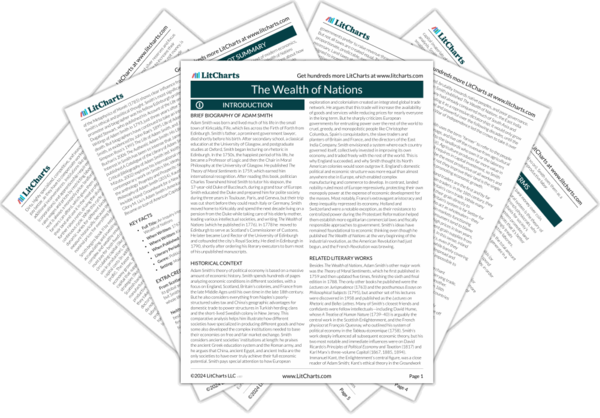Sovereign Quotes in The Wealth of Nations
Political economy, considered as a branch of the science of a statesman or legislator, proposes two distinct objects; first, to provide a plentiful revenue or subsistence for the people, or, more properly, to enable them to provide such a revenue or subsistence for themselves; and, secondly, to supply the state or commonwealth with a revenue sufficient for the public services. It proposes to enrich both the people and the sovereign.

Unlock explanations and citation info for this and every other The Wealth of Nations quote.
Plus so much more...
Get LitCharts A+Frequently a man of great, sometimes even a man of small fortune, is willing to purchase a thousand pounds share in India stock, merely for the influence which he expects to acquire by a vote in the court of proprietors. It gives him a share, though not in the plunder, yet in the appointment of the plunderers of India. [...] About the prosperity of the great empire, in the government of which that vote gives him a share, he seldom cares at all. No other sovereigns ever were, or, from the nature of things, ever could be, so perfectly indifferent about the happiness or misery of their subjects, the improvement or waste of their dominions, the glory or disgrace of their administration, as, from irresistible moral causes, the greater part of the proprietors of such a mercantile company are, and necessarily must be.
Ground-rents, so far as they exceed the ordinary rent of land, are altogether owing to the good government of the sovereign, which, by protecting the industry either of the whole people or of the inhabitants of some particular place, enables them to pay so much more than its real value for the ground which they build their houses upon; or to make to its owner so much more than compensation for the loss which he might sustain by this use of it. Nothing can be more reasonable, than that a fund, which owes its existence to the good government of the state, should be taxed peculiarly, or should contribute something more than the greater part of other funds, towards the support of that government.












